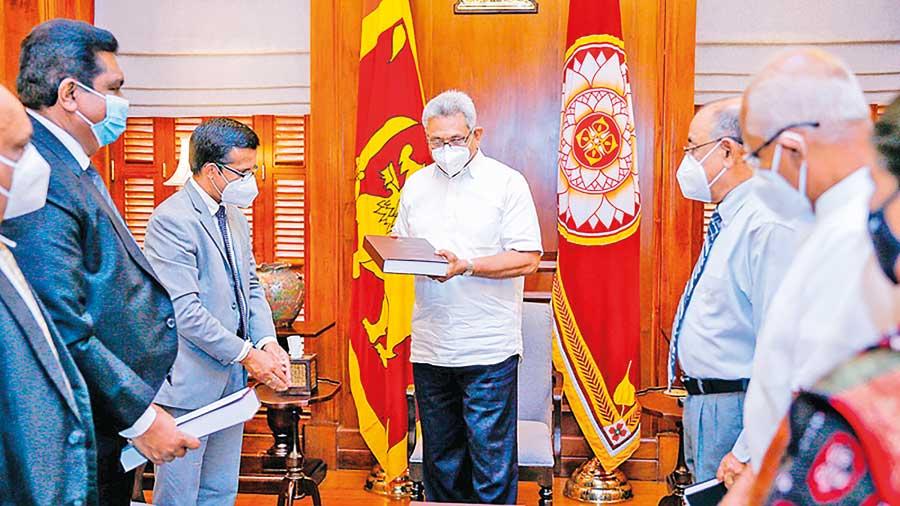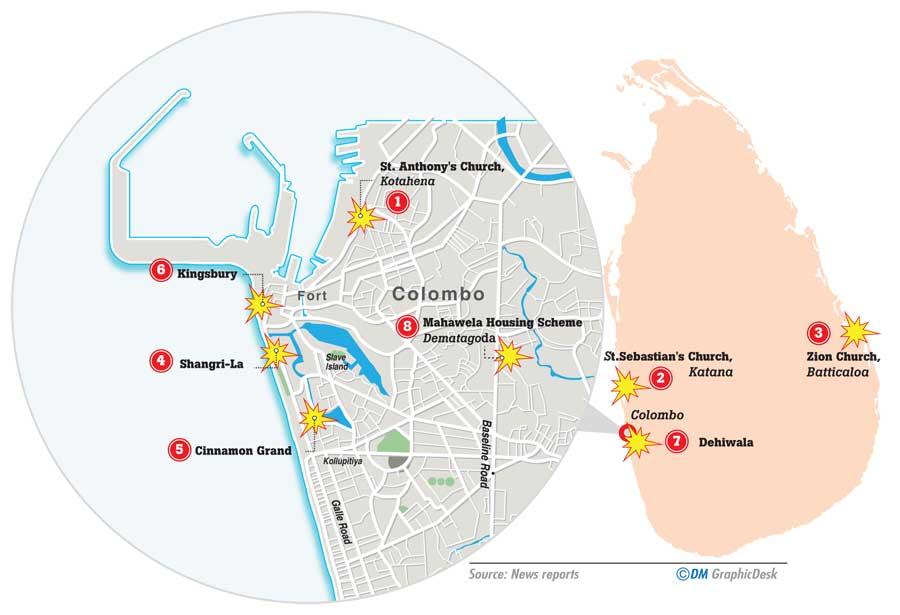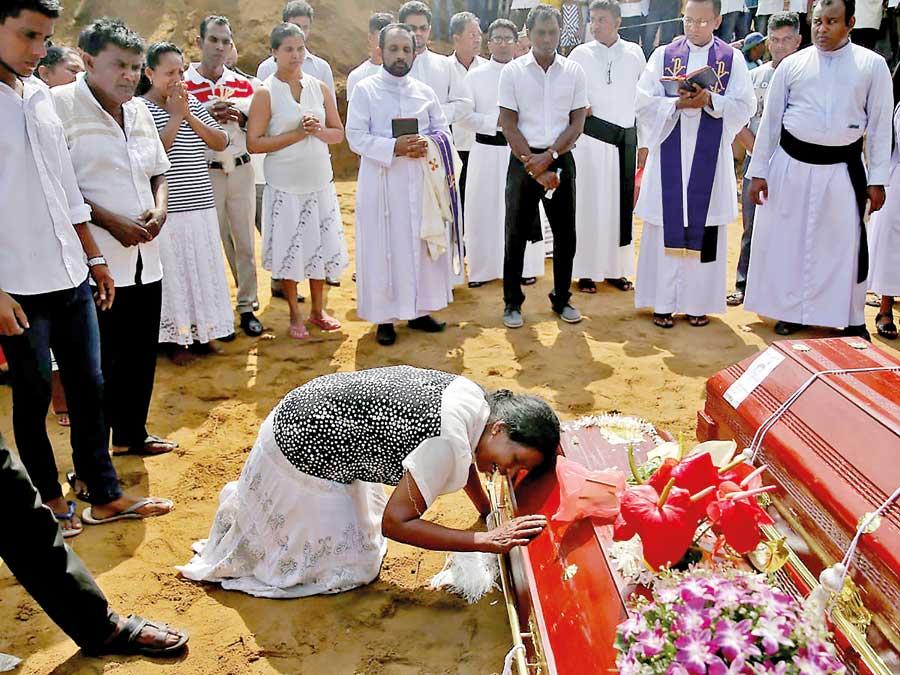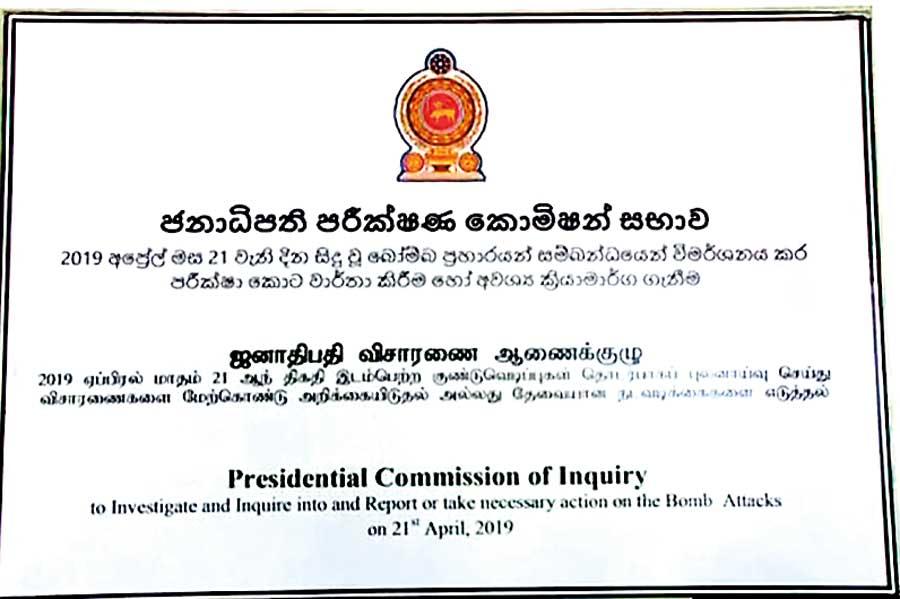Reply To:
Name - Reply Comment

- The Malalgoda Committee was promptly appointed by the former President, soon after the terror attacks
- The PCoI began recording fresh evidence from several witnesses with the list of witnesses including some key witnesses who were suspected to be directly involved in the attacks
- The PCoI probing the Easter Sunday attacks officially concluded its proceedings on January 27 and the final report was submitted to President Gotabaya on February 1, 2021
For more than a year, the Daily Mirror reported on the Presidential Commission of Inquiry (PCoI) appointed to inquire into the 2019 Easter Sunday Attacks. It concluded its proceedings on Monday. With 457 witnesses testifying before the Commission and numerous twists and turns along the way, have we found those responsible for the heinous attack?
to inquire into the 2019 Easter Sunday Attacks. It concluded its proceedings on Monday. With 457 witnesses testifying before the Commission and numerous twists and turns along the way, have we found those responsible for the heinous attack?
The coordinated terror attacks on April 21, 2019 targeting three churches and three luxury hotels in Sri Lanka had stirred dangerous undercurrents of hate against the country’s Muslim community. The bombings were recorded as Sri Lanka’s deadliest terror attacks to have taken place on a single day which sadly could have been prevented, if only the initial warnings received by both the ‘Yahapalana’ government and the members of opposition political parties had been heeded.
The ‘Yahapalana’ government assumed office in January 2015, underscoring peace and reconciliation as some of its key policies. However, the then government ended its tenure with a large number of partially fulfilled or unfulfilled promises, and the terror attacks tainting its reputation. There were two platforms appointed by former President Maithripala Sirisena immediately after the attack to probe this massive disaster.
"The PCoI probing the Easter Sunday attacks officially concluded its proceedings on January 27 and the final report was submitted to President Gotabaya on February 1, 2021"
The Malalgoda Committee was promptly appointed by the former President, soon after the terror attacks. Although this committee had submitted a final report, the findings could not be used because of insufficient evidence to prosecute the miscreants.
This was revealed by Committee Chairman Justice Vijith Malalgoda. The report was also taken up for consideration by the Parliament Select Committee (PSC) appointed by the then president in mid-2019 to record fresh evidence. However, at the end of its term the PSC submitted another report which again turned out to be only a document.
The final Presidential Commission of Inquiry (PCoI) was appointed by former President on September 21, 2019, a couple of months prior to the November 2019 presidential election at which President Gotabaya Rajapaksa was elected to office. The PCoI began recording fresh evidence from several witnesses with the list of witnesses including some key witnesses who were suspected to be directly involved in the attacks. This particular PCoI most importantly inquired into several areas, which were overlooked by the previous commission or committee.
The PCoI probing the Easter Sunday attacks officially concluded its proceedings on January 27 and the final report was submitted to President Gotabaya on February 1, 2021.
"The final Presidential Commission of Inquiry (PCoI) was appointed by former President on September 21, 2019, a couple of months prior to the November 2019 presidential election at which President Gotabaya Rajaapaksa was elected to office"
The PCoI headed by Supreme Court Judge Janak de Silva comprised Court Appeal Judge Nissanka Bandula Karunaratne, former High Court Judge Bandula Atapattu, former Appeal Court Judge Sunil Rajapakshe and Justice Ministry’s former Secretary Mangalika Adhikari.
It met on 214 days and recorded the evidence of 457 witnesses on 640 occasions. In addition, the AG’s Department assisted the inquiry and submitted 2,230 documents as supporting evidence. The final report consisting of 472 pages and 215 annexures also included six separate volumes with evidence and the documents submitted to the Commission.
However, it is important to note that all the witnesses who testified before these committees and commissions have only pointed fingers at each other and while they continued to ‘pass the ball’ the grave question of ‘what really happened’ is still left unanswered.
Daily Mirror Insight focused on three vital points revealed through the evidence recording process by the PCoI during its tenure of nearly one and a half years. These points are to be considered as key facts in the final report along with other supporting evidence.

Recommendations to implement new laws of extradition
At the conclusion of the recording of evidence, the Attorney General’s (AG) Department representative requested the five-member Commission, to include recommendations, which could pave the way to introduce legal provisions mainly to enable the extradition of suspects responsible or involved in the attack and were currently living abroad.
“Existing legal provisions are inadequate to prevent such situations in the future. Although there is an extradition law in the country there can be certain limitations when it comes to extraditing suspects currently living abroad,” Additional Solicitor General (ASG), who assisted the Commission, said. On the final day of the hearings, he said the United States had already indicted three suspects in connection with April 21 Easter Sunday Coordinated terror attack.
In December last year the Federal Court in the US City of Los Angeles indicted Mohammed Naufar, Mohammed Anwar Mohammed Riskan and Ahamed Milhan Hayathu Mohammed, who have been detained under the Prevention of Terrorism Act (PTA) in connection with these attacks.
"It met on 214 days and recorded the evidence of 457 witnesses on 640 occasions. In addition, the AG’s Department assisted the inquiry and submitted 2,230 documents as supporting evidence."
The ASG pointed out that questions have been raised as to whether the existing legal provisions were adequate to conduct a successful investigation. “When preparing the final report the members have to consider the above points. If not, it can be a problem in the future to conduct a fair investigation,” he told the Commission.
According to the current investigations nearly 200 suspects were arrested on charges of involvement in the attacks. Some of them were placed under detention orders according to the PTA and some of them held in
remand custody.
The extensive financial networks handled by the suicide bombers and the role of suspected foreign groups which had links with the bombers, were another aspect investigated by the Commission. During the inquiry the Criminal Investigation Department (CID) informed the PCoI that Insaf Ahamed, the suicide bomber who blew himself up at the Cinnamon Grand Hotel, had spent nearly Rs.45 million within the first four months of 2019 for the National Thowheed Jamaath (NTJ) organization to conduct extremist activities in the country.
“Insaf Ahamed owned several companies and always maintained a record of how he used the funds. However, he had not recorded how he disbursed the Rs.45 million. During the investigation it was revealed that money might have been used to conduct extremist activities within the country,” the CID detective informed the Commission.
The evidence also recorded details of several training camps conducted by NTJ Leader Zahran Hashim and the money spent on renting safe houses and places to conduct these camps. It was also revealed at the Commission that the members of the NTJ and those who supported it had maintained separate communication networks and links to share information and conduct their transactions.
"NTJ maintained 41 bank accounts and the funds had been received into those accounts via the Ibrahim brothers who blasted themselves at Shangrila-La and Cinnamon Grand hotels that Easter Sunday"

Suspected foreign links behind the attack
During the inquiry, the commission focused on the foreign links behind the attacks. Most witnesses who testified before the PCoI informed that Sri Lanka had still had not collected the details pertaining to actual foreign links behind the coordinated
terror attacks.
Most witnesses including former Chief of Defence Staff (CDS) Ravindra Wijegunaratne and former CID SDIG Ravi Seneviratne pointed out that according to their experience, the leader of any terrorist organization does not kill himself in the first instance and that there was a handler who manages the entire suicide squad.
National security would still be unsecure until the people who induced Zaharan Hashim to carry out the sudden terror attack are identified, CID’s fromer SDIG Ravi Seneviratne said.
“We have to identify the people behind Zahran and the attack. Until we are able to conclude that part of the investigations, this inquiry will be incomplete,” he said.
Mr. Seneviratne said the plan to carry out the attack in April 2019 was Zahran’s own decision and for that decision some members of National Thowheed Jamaat (NTJ) were at loggerheads with Zahran.
"The suicide bomber who blew himself up at the Cinnamon Grand Hotel, had spent nearly Rs.45 million within the first four months of 2019 for the National Thowheed Jamaath (NTJ) organization to conduct extremist activities in the country"
“Zahran Hashim was active from 2014 and he had initially decided to conduct terror attacks in 2017 or 2018,” he told the PCoI.
Mr. Seneviratne said according to the CID inquiry it had found that the NTJ maintained 41 bank accounts and the funds had been received into those accounts via the Ibrahim brothers who blasted themselves at Shangrila-La and Cinnamon Grand hotels that Easter Sunday.
Mr. Seneviratne said the CID had led extensive investigations into Zahran’s connection with a foreign organization but it could not trace anything regarding
that organization.
Meanwhile, he said according to CID investigations the NTJ’s plan was that in case any of the suicide bombers had failed to carry out the attack he or she had to go to a safe house and that they had selected a church in Colombo as the safe house.
According to the evidence led before the Commission the connection among the NTJ, Zharan and the foreign links handling him were highlighted. However, the recording of this evidence opened to the media had not disclosed the identity of the actual foreign links behind Zharan.

Communication errors and intelligence lapses
It was also revealed that intelligence failures and communication gaps were the most common reasons presented before each and every committee and commission which probed the Easter Sunday terror attacks and that the failure of Sri Lanka’s Intelligence Services and investigation units had assisted Zharan and his associates to freely conduct extremist activities.
Sri Lanka first received foreign intelligence to the State Intelligence Service (SIS) on April 4, 2019 detailing Zaharan’s plans to conduct a terror attack targeting Christian churches. The final piece of intelligence received by the SIS through a foreign source on April 20, 2019, the day before the attack, also confirmed it.
It was clear that there were serious lapses when sharing vital intelligence. Former President Maithripala Sirisena testifying before the Commission said neither SIS Director Nilantha Jayawaradena nor former Defence Secretary Hemasiri Fernando, nor any other responsible person had informed him about the intelligence reports.
There were several National Security Council (NSC) meetings and Intelligence Coordination Meetings (ICM) but none of the officials who received first-hand information about the terror attack discuss the information at these meetings. These points were mentioned before the PCoI
countless times.
If matters were such, the question arises as to the dysfunctional level of operations of the country’s intelligence services, investigation units and the authorities involved in ensuring national security. It only reinforces the need for the Sri Lanka’s leaders to reform and revitalize all security institutions and intelligence services.
On one occasion, responding to a question raised by the AG’s department regarding foreign intelligence, former Chief of Defence Staff Admiral Ravindara Wijegunaratne said former State Intelligence Service (SIS) Director had followed a ‘lookup policy’ when informing about the intelligence.
“Former SIS Director had only conveyed the intelligence to the higher officials above him, he had not alerted the ground level officers who could have taken actionable measures related to facts mentioned at the intelligence meetings,” the former CDS said. He said the former SIS Director attempted to debrief the former President on the foreign intelligence but failed to inform the heads of the tri-forces.
Meanwhile, when Commissioners questioned the witness regarding the dry run by detonating a bomb set on a motor bicycle in Palamunai on April 16, 2019, the former CDS said the incident was done deliberately to mislead the Sri Lankan people. “No one can learn about making bombs within two weeks. There has to be a proper training when manufacturing such explosives. That’s why I’m saying we still have details of the actual background that led to these tragic incidents,” he said.
The former CDS said the backbone of the intelligence services had been deconstructed during the previous ‘Yahapalana’ government and as a result the entire intelligence network was inactive and ineffective. “That was why we had missed the most important intelligence on the possible terror attack. Our ground level intelligence sources were weak during the previous government’s tenure,” he said.
All security and political heads of the previous ‘Yahapalana’ government testified before the Commission and none of them were able to provide concrete evidence regarding the situation, other than placing the blame on each other.
Daily Mirror Insight learned that the PCoI report has to be re-examined, especially in terms of political interests and policy failures prior to the bombings.